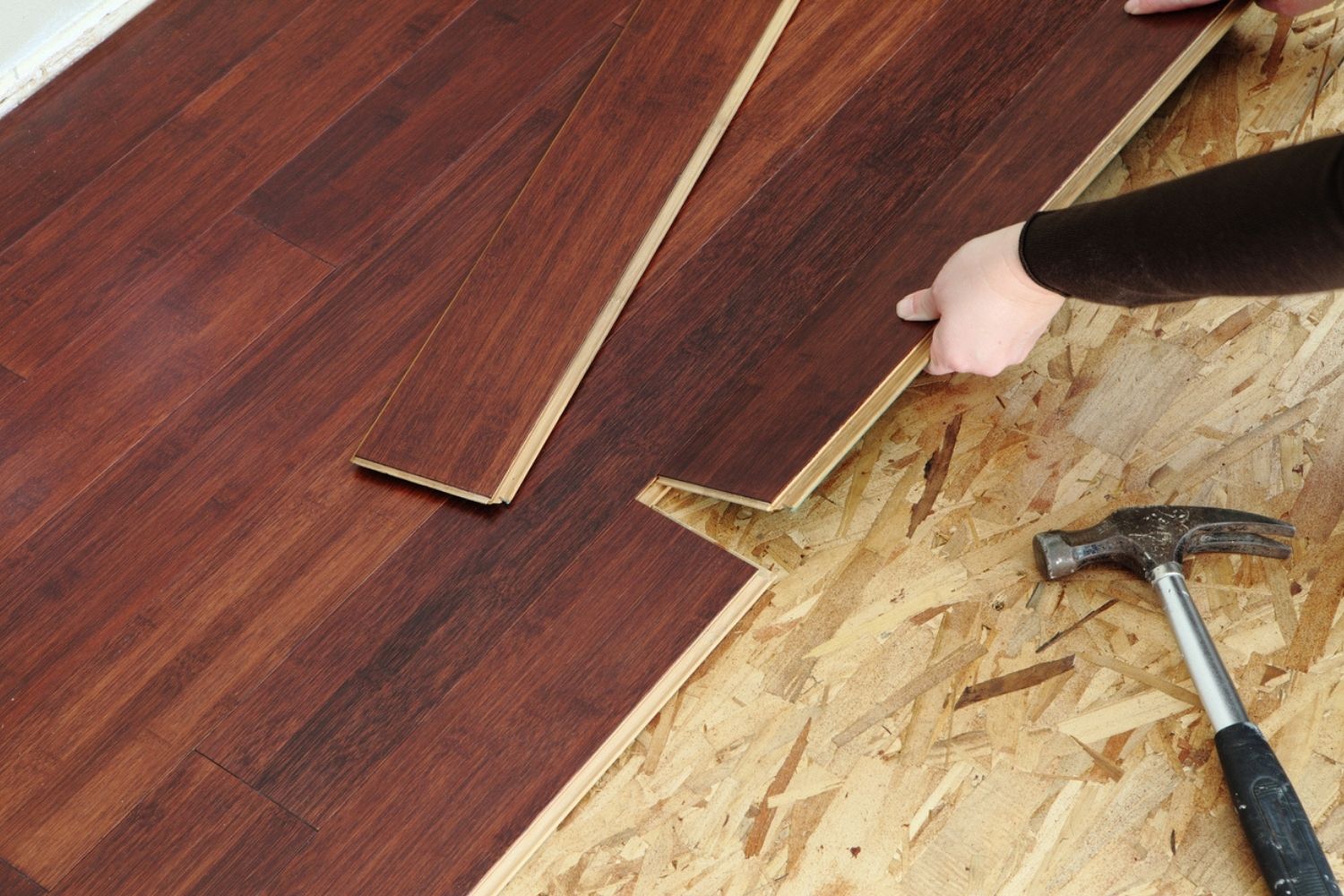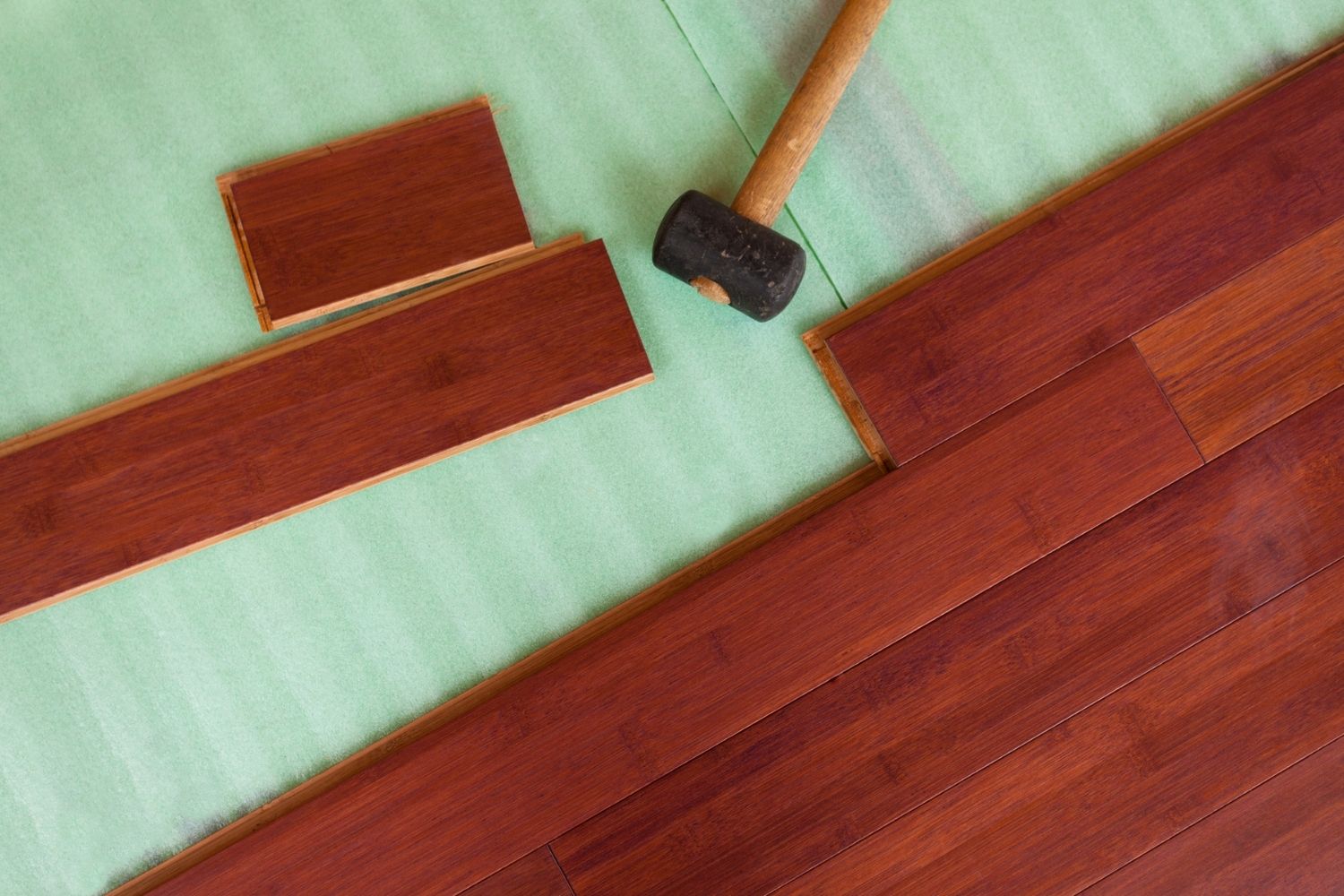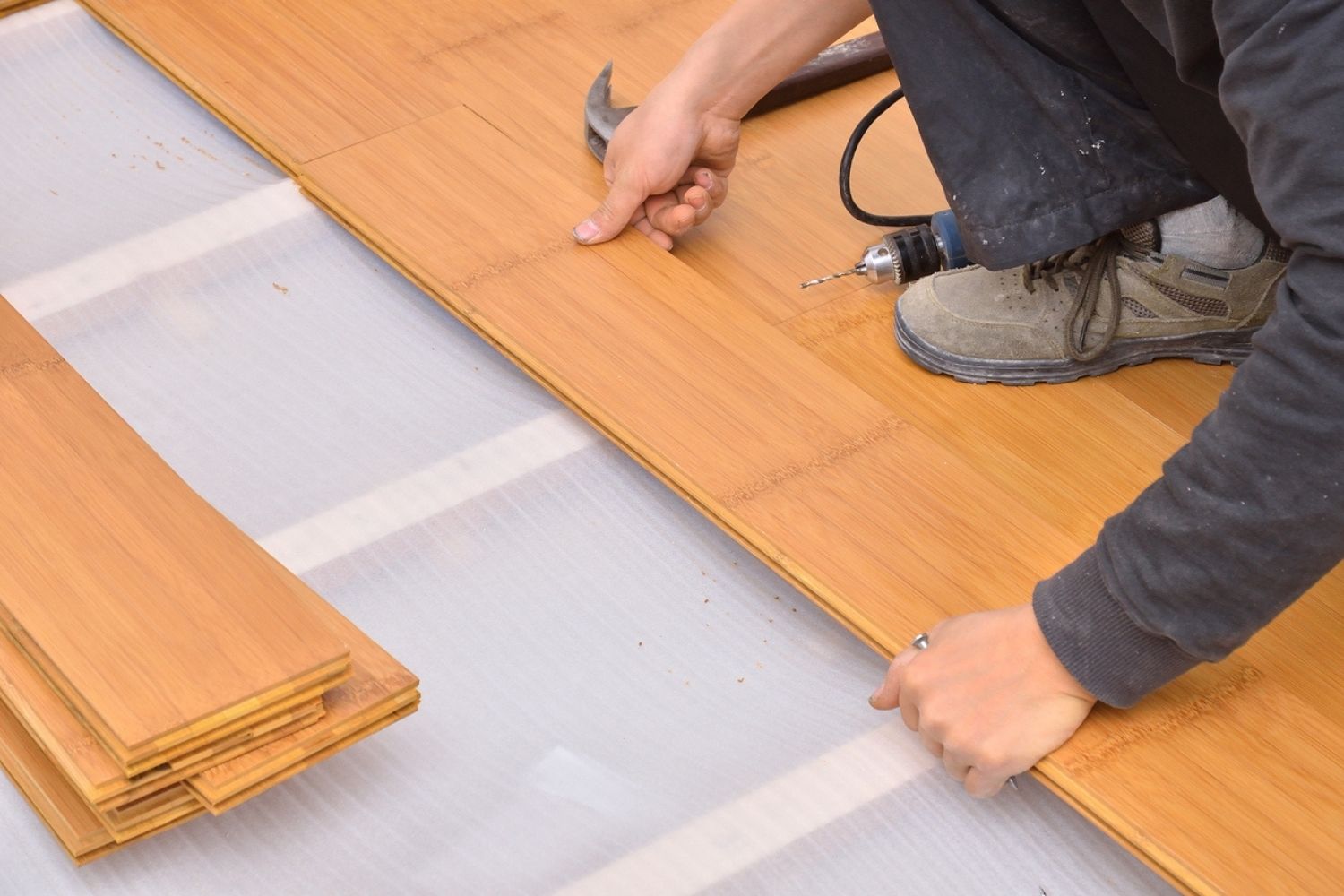

We may earn revenue from the products available on this page and participate in affiliate programs. Learn More ›
- Typical Range: $1,500 to $15,000
- National Average: $6,000
Bamboo flooring is a trendy and eco-friendly option that impresses homeowners with its unique look and durability. This popular flooring option accepts stains just like hardwood and can add a modern appearance to a home. According to HomeAdvisor, bamboo flooring costs can range from $1,500 to $15,000, with the national average at $6,000. This comes out to $5 to $15 per square foot, including labor and materials. Here, we’ll examine bamboo flooring pros and cons, what factors go into bamboo flooring costs, additional price considerations, the different types of bamboo hardwood floors, and what questions to ask about bamboo floor installation.
Factors in Calculating Bamboo Flooring Cost
Many factors impact bamboo flooring cost. Prices can differ from the national average due to the area needing to be covered, bamboo type, quality, brand, and labor costs.
Area Covered
The price of flooring materials isn’t the only expense for new flooring installation. Prepping the area for new flooring involves getting rid of the existing flooring, which can raise the price of labor. Typically, the larger the area that needs to be covered, the more expensive it will be since more flooring material is required, and a large amount of old flooring will need to be hauled away. It’ll cost between $1,250 and $2,500 to install a bamboo floor in a 250-square-foot room and between $7,000 and $20,000 to install bamboo wood flooring in a 2,500-square-foot home. Homeowners can typically find the average cost to install bamboo floors by multiplying the total installation area by $8.
Bamboo Type and Quality
Bamboo flooring is available in different types and various colors. Bamboo flooring costs can fluctuate due to the quality and variety of bamboo. Older and more mature bamboo is a more rigid flooring material and is considered higher quality than younger, softer options. Different types of bamboo flooring include horizontal, vertical, strand-woven, and engineered bamboo flooring. The prices of these types vary depending on how the bamboo strands are arranged and how the materials are treated.
Brand
Pricing for bamboo flooring installation also depends on the brand of flooring you choose. Expect to pay anywhere between $2 to $11 per square foot, not including labor costs, depending on the brand. Here are some of the most popular bamboo flooring brands and their average prices per square foot.
- Lifeproof: $3 to $4
- ECOfusion: $3 to $9
- Cali Bamboo: $3.50 to $8
- Islander: $4.50 to $6.50
- Teragren: $6 to $9
Labor
Labor costs average between $30 and $45 per hour or $2.50 to $6 per square foot. Labor doesn’t include only the installation cost, but it also consists of the precise measurements of the area, planning, preparation, cutting the bamboo boards, and cleaning up. Prepping the area can involve ensuring that the surrounding walls, cabinets, flooring, and molding are protected during the installation process. Labor prices can fluctuate due to the experience level of the installers and your geographic area. Labor costs are typically more expensive in densely populated urban areas, where living costs are higher than in more rural areas.

Additional Costs and Considerations
When budgeting for bamboo flooring costs, it’s helpful to know any additional price factors and considerations that can increase the price of the installation project. These can include supplier cost differences; additional costs for subfloor installation, preparation, or floor removal; molding and baseboard repair or replacement; and staining and finish.
Supplier
Depending on the brand, quality, and supplier of bamboo flooring, the price can range between $2 and $11 per square foot. Here are some of the average prices per square foot for uninstalled flooring by some of the most popular bamboo flooring distributors.
- Lumber Liquidators: $2 to $4
- The Home Depot: $2 to $6
- Lowe’s: $2 to $7.50
- Wayfair: $2.50 to $10
- BuildDirect: $3 to $4
Subfloor Installation, Preparation, or Floor Removal
Bamboo flooring costs often include preparing the subfloor and removing the existing floor. If the subfloor needs replacement or repair, installation costs can significantly bump up. Repairing a subfloor can cost between $500 and $720, joist repair can run from $40 to $60 per square foot, and repairing hardwood flooring averages between $450 and $1,500. Any type of bamboo flooring can be installed on top of wood subfloors. For concrete subfloors, only engineered bamboo flooring can be used. If a homeowner wants to add a foam subfloor or vapor barrier, this can add $2 to $4 per square foot.
Moldings and Baseboards
Putting in new flooring involves removing the molding, baseboards, and trim—which adds time and money to a project. The exact additional cost will depend on how much trim you have, its style, and if you want to replace the old trim with a new one.
Finish and Staining
Bamboo flooring typically comes prefinished to avoid the additional costs to finish and stain it. Unfinished bamboo flooring can be stained to match the color scheme of your home, although buying finished bamboo flooring costs less than hiring a pro to stain unfinished flooring.
Bamboo Flooring Types
How much you’ll pay for bamboo flooring depends on the type, quality, and style you choose. Older, more mature bamboo is considered higher quality than younger and softer bamboo. Since bamboo is grass and not hardwood, there are many different ways to construct bamboo flooring planks. Bamboo flooring is versatile and available in many finishes and color options. Here are the most common types of bamboo flooring options.
Engineered Bamboo Flooring
Engineered bamboo flooring has a thin layer of bamboo veneer on top of a wooden flooring substrate. This type of bamboo flooring is typically less expensive than solid bamboo, and some homeowners avoid this option since it cannot be refinished.
Horizontal Bamboo Flooring
Horizontal bamboo flooring is designed from thin layers of bamboo that have been cut into strips that are glued side by side to show the grain and knots within the stalks. Multiple layers of lacquer are added for a protective finish. This solid bamboo flooring has an attractive, wide-grain pattern.
Vertical Bamboo Flooring
Vertical bamboo flooring is also solid flooring in which thin, small strips are dried, glued together, and arranged vertically to create a more consistent flooring design. These planks are usually fitted together with a tongue-and-groove installation method, and they’re finished and protected by layers of lacquer. The grain pattern in vertical bamboo flooring is thinner and less evident than in horizontal planks.
Strand-Woven Bamboo Flooring
The most expensive option, strand-woven bamboo flooring is constructed of shredded fibers, strands, and thin strips of bamboo. They are combined with resin and heat compressed with extreme pressure to form flooring planks. Strand-woven bamboo flooring is considered more durable and versatile than horizontal or vertical bamboo flooring. The planks have a random grain pattern, and tiger strand-woven bamboo flooring uses dark and light-colored bamboo strips to create more visual interest. Strand-woven flooring can click together or have a tongue-and-groove fitting profile. It’s available in various plank lengths and widths and can be engineered or solid bamboo.

Benefits of Choosing Bamboo Flooring
Bamboo flooring continues to be more and more popular with homeowners and developers due to its durability, strength, cost-effectiveness, and sustainability. There are plenty of benefits for homeowners and installers—and the environment—when it comes to bamboo flooring.
Easy Installation
Bamboo flooring is easy to install, and some homeowners even decide to install it themselves. Solid and engineered flooring can be installed either by floating it over an underlay, gluing it down to a subfloor, and nailing or screwing it down. Some bamboo flooring planks are available as click flooring to make installation as easy as possible.
Sustainable Choice
Bamboo isn’t a hardwood but a grass that can quickly mature in 5 years. For comparison, trees take 30 to 50 years to reach maturity. Bamboo also will continue to grow without replanting since the root system is left in place during harvesting. This also means a lesser chance of erosion since the soil isn’t being disturbed. Bamboo is harvested by hand, so there’s generally less damage to the surrounding area. To ensure the bamboo flooring you choose is environmentally friendly, look for the Forest Stewardship Council (FSC) certification that guarantees the company harvesting the bamboo is not harming animal life, plants, or forests.
Durability
Strand-woven bamboo flooring is twice as durable as oak hardwood flooring. The horizontal and vertical solid bamboo flooring options are comparable to the durability of oak flooring and are a good choice for flooring throughout the home.
Cost-Effective Choice
Installing new flooring in your home can get expensive. Bamboo flooring is a budget-friendly option compared to traditional hardwood flooring. Homeowners can enjoy a natural product with long and wide planks at about half to a third of the price of hardwood flooring planks with the same measurements.
Easy Customization
Bamboo flooring comes in various colors, finishes, styles, and grains. No matter the style of your home, you should be able to find bamboo flooring that will complement the overall aesthetic of any room.
Low Maintenance
It’s recommended to sweep a bamboo floor daily with a soft-bristled broom and clean it weekly with a bamboo flooring cleansing spray. Wiping up spills, removing shoes, and using felt protection pads under any furniture can also help prevent scratches and damage to bamboo flooring. Since layers of lacquer protect bamboo flooring planks, it’s easy to maintain with quick cleaning practices.
Moisture, Mold, and Mildew Resistant
Bamboo flooring is resistant to mold and mildew that can otherwise grow in rugs and carpeting. You may be wondering, “Is bamboo flooring waterproof?” It’s not waterproof, but the flooring will not be damaged if spills are wiped up quickly. Bamboo flooring is not recommended for use in bathrooms, utility rooms, or other areas prone to excess moisture.
Bamboo Flooring Installation: DIY vs. Hiring a Professional
Some homeowners opt to save money on bamboo flooring costs and install the flooring independently. Installing bamboo flooring can be a straightforward project, especially when the flooring type can be installed by clicking it together. But if the subfloor needs to be repaired or replaced, many homeowners hire a professional to tackle that project, even if they plan on installing the flooring themselves. If you have little experience with flooring installation or you’re not sure where to start the process of laying the flooring planks, it could cause excess waste or installation errors that may cost you more in the long run.
Some benefits of having a professional install the bamboo flooring are that they can install it with minimal waste, which will save money on the cost of materials. If the room that needs new flooring isn’t perfectly square, a professional will know where and how to begin the installation to ensure the grain is evenly lined up. If you install the flooring on your own over an uneven subfloor, you’ll end up having to pull it all back up and get the subflooring repaired or replaced. For most homeowners, the expense of paying for bamboo flooring installation costs outweighs the hassle and time it takes to do it on their own.
How to Save Money on Bamboo Flooring
New flooring can be a pricey endeavor, especially if you’re reflooring a whole home, and the additional costs associated with the installation can quickly add up. One way to save money on bamboo flooring is to install a cheap bamboo floor, but there are other ways to save without compromising on flooring quality.
- Get multiple estimates. Professional flooring companies usually offer free estimates. Get at least three quotes from reputable flooring companies in your area. This way, you can be prepared for the project’s overall cost and budget accordingly.
- Look for sales and shop around. Comparing pricing is an excellent way to find the most budget-friendly bamboo flooring option for your home. Some home improvement stores have a price-matching policy that you can take advantage of while using discounts or coupons. Consider delaying your flooring project to make the most of holiday sales and price markdowns.
- Choose flooring that works for you. Getting the most expensive type of bamboo flooring may be tempting, but choosing the type of flooring that works the best for you and your family will save money in the end.
- Negotiate. Many flooring companies may negotiate the cost of installing bamboo flooring in your home. Some companies may lower the prices of the materials or installation costs. It never hurts to ask.

Questions to Ask About Bamboo Flooring Installation
Asking the right questions about bamboo flooring costs and installation can minimize miscommunication and save money. Here are some questions to ask a bamboo flooring professional.
- Do you have examples of your previous work?
- What kind of training does the staff have?
- Can you provide references?
- Who will install the bamboo flooring in my home?
- Will you visit my home before the installation begins?
- Do you provide a free estimate?
- How long will the flooring installation take?
- What kind of flooring do I need in my home?
- How much flooring do I need in my home?
- Is bamboo flooring the right choice for the climate I live in?
- What is the process if the subfloor needs to be repaired or replaced?
- Are the flooring and glue safe from any potential health risks?
- Is it OK if the bamboo flooring is glued directly to a concrete subfloor?
- What type of maintenance is required for bamboo flooring?
- Can bamboo flooring be sanded, stained, and refinished like hardwood flooring?
- Do you offer a warranty? If so, what does it cover, and how long does it last?
- How will the bamboo flooring be finished where it meets carpeting or other flooring?
- How can I leave a review after the installation?
FAQs
Deciding on bamboo flooring installation while staying within your budget can be a daunting process. Here are some frequently asked questions about bamboo flooring costs to help guide you in your decisions.
Q. How much does bamboo flooring cost?
Bamboo flooring typically costs between $1,500 and $15,000, with the national average at $6,000, or $5 to $15 per square foot, including labor and materials.
Q. How long does bamboo flooring last?
Bamboo flooring can last between 20 and 50 years, depending on the quality and how well it is maintained.
Q. Is bamboo flooring suitable for kitchens?
Bamboo flooring is highly versatile, and it works well in kitchens. It’s durable when spills are quickly cleaned up and the floor is maintained regularly.
Q. Is bamboo flooring prone to scratching?
One con of bamboo flooring is that it can scratch easily. Lighter-colored bamboo is more durable since the process used to darken the material also softens it by about 20 percent.
Q. Does bamboo flooring increase home value?
Bamboo flooring can increase a home’s value if homeowners upgrade to bamboo flooring from carpeting or vinyl flooring. It can also increase the return on investment if moderate to high-quality bamboo flooring is installed and if it compares to similar flooring materials that are used in other homes in your neighborhood.
Sources: HomeAdvisor, Thumbtack, Angi
